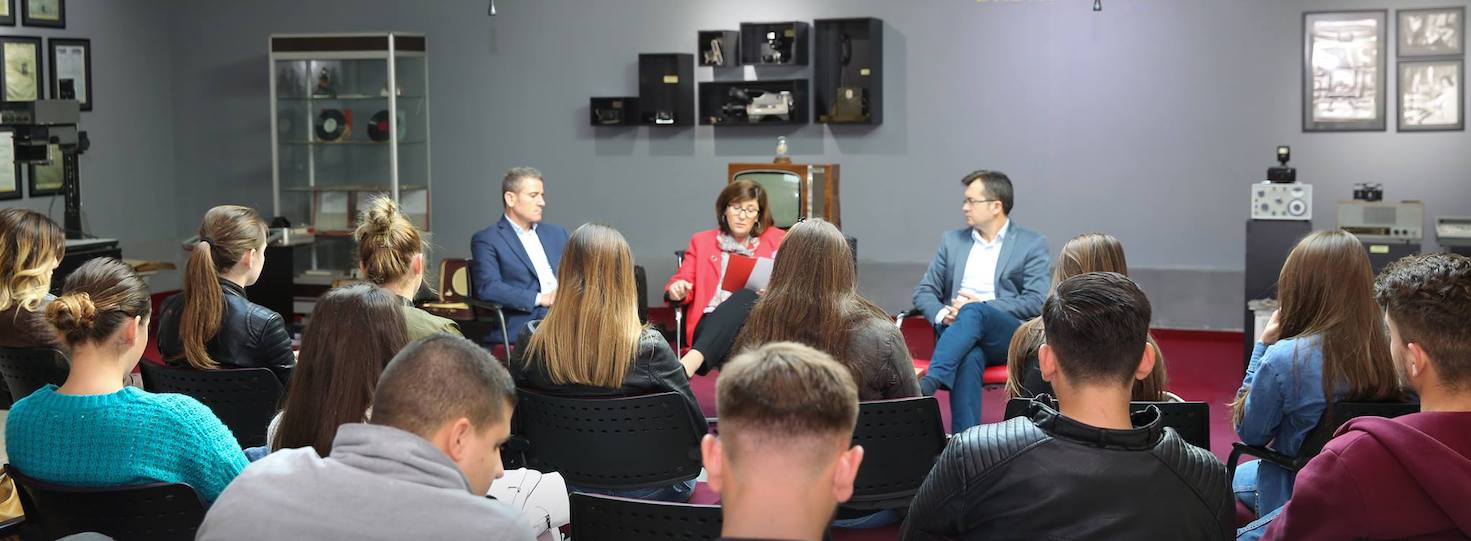
About the program
The first cycle studies in Journalism and Multimedia Communication sets out an education for all students who are interested in building their professional careers, both in the public and the private sector in different areas in which information flow is done through various tools, as well as in communications and public relations. The program is designed to provide an intellectual and professional education for students, advance a variety of conceptual and perspective in communications and media, including new media as a direct result of technological developments in the field.
Bachelor in Journalism and Multimedia Communication lasts three academic years, divided into six semesters, and includes a total of 180 ECTS (European Credit Transfer System). 1 ECTS = 25 hours.
Students receive a diploma entitled "Bachelor in Journalism and Multimedia Communication ", after accomplishment.
Mission
The mission of the Department of Communication Sciences is to prepare qualified individuals in the field of journalism, communication, public relations and similar fields, through an educational philosophy that is based on universal values, as well as supporting scientific research, in order to implement ideas and projects that directly affect the improvement of human life and society at large, in accordance with modern technology developments in the field of communication.
Vision
The Department of Communication Sciences will bring innovation in training methodologies and preparing students through a good interweaving of theory and practice within contemporary conditions and opportunities. The academic staff is fully dedicated to its mission, in terms of changing global society and the rapid development of modern technologies involving media communication field. The department will encourage the students to love and respect their country and will support everyone's commitment to independent and free media, with a transparent and honest communication based on deontological principles of ethics.
Program Objectives
- Preparing students equipped with contemporary knowledge in the field of journalism and communication;
- Training students according to needs of labor market;
- Familiarize students with issues related to the field of journalism and communication;
- Gain skills to collect, analyze and professional information reporting;
- Knowing the ethics issues in reporting;
- Integrating theory and practice to experience aspects related to field of study;
- Providing a suitable environment for proper professional training of students;
- Increasing knowledge to use technology in gathering and distribution of news;
- To understand the need of intercultural communication.
Program Outcomes
At the end of the program “Bachelor in Journalism and Multimedia Communication”, students are able to do:
- identify, compare and interpret the basic concept of communication, journalism and public safety
- understand, develop and apply the knowledge gained in informing the public and;
- understand and analyse the impact of society on the media and the impact of the media on individuals and society
- develop the ability to communicate effectively and your ability to speak in public, to meet general and specialized audiences in the field of communication and media
- develop the ability to engage effectively in the group to meet a goal,
- Demonstrate skills in defining and comparing disciplined and other fields of study undertaken with the science of communication
- apply and evaluate the main concept to trust the public in different sectors of society
- develop and implement critical thinking and media content evaluation analysis
- explore and apply communications and search with audiences on new platforms and media
- distinguish the differences between traditional media and new media based on digital technology
- describe, compare and analyse different genres of journalism and media
- identify and analyse differences and different media, form their content and directions with audiences and users
- Demonstrate knowledge and appreciate the importance of information in shaping public opinion and decision making
- analyse theoretical and practical approaches in the field of media education and apply the aircraft to a well-known category and different audience
- Demonstrate proficiency in language concepts and apply appropriate rules in news writing and other texts in the field of public communication.
- to know the knowledge needed for research and to apply it in a field of communication, media and journalism
Employment opportunities
Graduates of this program are communication specialists. They can work as journalists, editors, reporters, correspondents, audiovisual programs moderators, spokespersons, analysts or specialists in press and information offices, public relations offices, media advisors, or media executives.